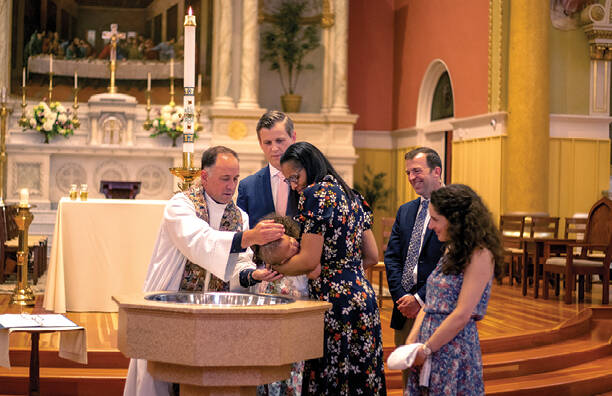Editors’ note: This fall, America Media released the groundbreaking documentary “People of God: How Catholic parish life is changing in the United States” with the aim of sparking a national conversation about the diverse ways the Catholic faith is lived out across the country. To help facilitate those conversations—in your parish, with your family or in the comments section—Jim McDermott, S.J., has offered a reflection on each of the four segments of the film as well as a number of discussion questions. You can read Part IV below, and follow the links for Part I, Part II and Part IV.
When you talk to Catholics about the church today, especially younger Catholics, a frequent complaint is that the church is not a welcoming place. L.G.B.T. individuals are fired from their jobs for no reason or find their existence condemned by church members. Women are not given any authority or are lectured to. Parishioners scowl at talking children and their parents or say inappropriate things to people of color. Homilies are boring or talk down to people.
Truly, as we look at the feedback from our membership and those who have left the church, what they are telling us is that we are in the midst of a crisis of welcome. In the final segment of America’s new documentary, “People of God: How Catholic parish life is changing in the United States,” producer Sebastian Gomes and the America film team visited St. Cecilia Parish in Boston and looked at how they work to address that concern, how they seek to be a community of welcome.
The secret of St. Cecilia’s success seems to be that they really try to see and hear the needs being expressed in their community.
The secret of St. Cecilia’s success seems to be that they really try to see and hear the needs being expressed in their community and to respond to them. Why did St. Cecilia start a digital ministry? They saw that people were hungry for it and had nowhere else they felt they could go. Why are they committed to L.G.B.T. ministry? Mark Lippolt, a gay parishioner, pointed out pretty much everyone today has L.G.B.T. relatives. The community wants their parish to be a place where they and those family members can feel safe. (Frankly, the same is true for many celibate gay priests, brothers and nuns. In some places in the church you just don’t feel like it’s okay to be yourself.)
There are a couple passing moments in the story where we see parishioners sitting in the very cozy-looking renovated parish gathering space. In one shot it’s a family with a young child; in another it’s some older parishioners, at least one with a walker. In both cases they’re watching the Mass. It seems that the parish has decided to make its gathering space available to people who want to be at Mass but for some reason can’t be in the church itself. Once again, the parish’s choices seem to be drawn from the specific needs of its people.
Another parish might address questions like their online presence or how to serve L.G.B.T. Catholics and their families in other ways. Their problems may be different as well. The important question is, are we listening to what our people are saying? And how are we responding?
Watching the story of St. Cecilia, I am reminded of the parable of the talents. St. Cecilia was generous when people needed somewhere to worship during the pandemic and provided a way for them to feel connected and a real part of their worshiping community. Some might have feared how they would sustain that, but in fact instead of draining their resources it seems like it generated new ones, including tremendous good will. To those who have given much, more will be given…
Questions for reflection and conversation
- What are the big issues you see in your parish? How is your community responding?
- In what ways is your church a welcoming community? In what ways is it not?
- Looking around your community on a Sunday, who isn’t there? What kinds of people don’t seem to be coming to your community?
- What kinds of spaces do they have in your church for welcome and fellowship?
- For those who worship online, what about that experience brings you life? How does it compare for you to worship in an actual church?
Listen next:
On this bonus episode of the Jesuitical podcast, hosts Ashley McKinless and Zac Davis speak with Jim McDermott, S.J., and Sebastian Gomes, the producer of “People of God,” about the rise of the “remote parishioner” in the wake of the Covid-19 pandemic.








